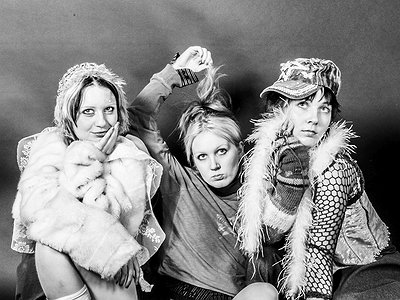Name: GRÓA
Members: Karólína Einars Maríudóttir, aka Karó (lead vocals, guitar, synth), Hrafnhildur Einars Maríudóttir, aka Hrabba (drums, vocals), Fríða Björg Pétursdóttir (bass, vocals)
Nationality: Icelandic
Current event: GRÓA recently performed at Iceland Airwaves Off-Venue Show at Pianos in New York City on May 11th 2023. Their 2021 sophomore album What I like to do is still available.
Recommendations: Suspiria 1977, listening to the beautiful Goblin soundtrack. The underground music scene in Iceland.
If you enjoyed this GRÓA interview and would like to stay up to date with the band and their music, visit them on Instagram, and Facebook.
When I listen to music, I see shapes, objects and colours. What happens in your body when you're listening? Do you listen with your eyes open or closed?
We all listen differently, it depends on the music and sounds we are listening to. I listen with my eyes closed and get the feeling of shapes connected to the texture of the sound for example - Karó.
But we all agree on seeing songs in colors, especially our own songs. We all agree on “María” being such a red song. “Boom Boom Boom” is a rainbow though.
What were your very first steps in music like - and how do you rate gains made through experience versus the naiveté of those first steps?
We all started out on the classical piano, and we’ve all gained a lot of new ways to create and make music.
According to scientific studies, we make our deepest and most incisive musical experiences between the ages of 13-16. What did music meant to you at that age and what’s changed since then?
Interesting, I want to see those studies …
We started playing together at that age. Our music has grown as much as we have from being teens. The feeling of freedom and the constant new discovery, and you’re really thinking about things for the first time. Everything is new and exciting, in life and in music.
Over the course of your development, what have been your most important instruments and tools and how have they shaped your perspective on music?
The most important instruments have been our voices and the drum kit.
We don’t really know how it has affected us, except for trying new things with it.
What, would you say, are the key ideas behind your approach to music and what motivates you to create?
Our key idea is to make. Keep on making, exploring and do it for ourselves and our music.
Our friendship motivates us a lot to create.
Paul Simon said “the way that I listen to my own records is not for the chords or the lyrics - my first impression is of the overall sound.” What's your own take on that and how would you define your personal sound?
We agree with hearing the overall sound first and also connecting to the core feeling we had when we made it.
Sound, song, and rhythm are all around us, from animal noises to the waves of the ocean. What, if any, are some of the most moving experiences you've had with these non-human-made sounds? In how far would you describe them as “musical”?
In terms of describing these non-human sounds as musical, I believe they are musical in their own way. They have a rhythm and melody that is uniquely their own.
But we believe every single sound we hear is music … even Karó’s farts ...
From very deep/high/loud/quiet sounds to very long/short/simple/complex compositions - are there extremes in music you feel drawn to and what response do they elicit?
We often feel drawn to emphases.
From symphonies and traditional verse/chorus-songs to linear techno tracks and free jazz, there are myriads ways to structure a piece of music. Which approaches work best for you – and why?
We often make songs from improvisations, both on instrument and vocals. And the structure often devolves from that.
Could you describe your creative process on the basis of one of your pieces, live performances or albums that's particularly dear to you, please?
We have a lot of memorable creative processes. Many dear moments come from improvising.
And one dear moment was when we felt stuck in our writings, and decided to bang on everything around us, the floor and top of the garage, shelfs and bottles and “Fullkomið” was born. Our most intense love song.
Sometimes, science and art converge in unexpected ways. Do you conduct “experiments” or make use of scientific insights when you're making music?
Not really.
How does the way you make music reflect the way you live your life? Can we learn lessons about life by understanding music on a deeper level?
Music reflects on everything in our lives, GRÓA is deeply connected to our personal lives. Our brains are constantly processing something, even when we are not aware of it.
Do you feel as though writing or performing a piece of music is inherently different from something like making a great cup of coffee? What do you express through music that you couldn't or wouldn't in more 'mundane' tasks?
Yes, I think it is completely different.
Every time I listen to "Albedo 0.39" by Vangelis, I choke up. But the lyrics are made up of nothing but numbers and values. Do you, too, have a song or piece of music that affects you in a way that you can't explain?
Yes, especially if it is a song, or piece, you connect to a memory or feeling.
If you could make a wish for the future – what are developments in music you would like to see and hear?
I would love to see and hear GRÓA play as an 80 year old, hopefully as grandmas.




